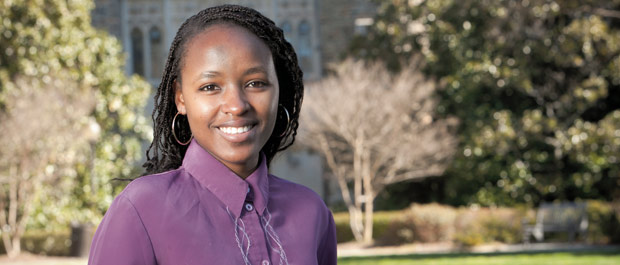Duke students traverse all sorts of distances before setting foot on campus, but few have covered as much cultural and geographic ground as Nash Mepukori.
A member of the seminomadic Maasai, Mepukori was raised in Nakuru, an urban part of Kenya, and left home at the age of ten for boarding school. She encountered classmates from all over her country who represented various cultural and socioeconomic backgrounds. She continued her trajectory at the African Leadership Academy in Johannesburg, South Africa. Its rigorous curriculum of entrepreneurial training and service-learning attracts some of the brightest students from around the continent.
Mepukori was hooked on the high-achieving environment, full of teenagers who had already started their own companies, spearheaded sustainable-energy projects, and delivered TEDx talks on ways to address some of Africa’s most pressing needs. She saw her peers as an extension of Africa’s potential, and her own. “You don’t feel as overwhelmed by the statistics you read and the news you watch,” she says. “Africa is fragile, and one person can ruin an entire country, but one person can change an entire country as well.”
Nashipai Mepukori ’16Majors: Global health and international comparative studies (intended)Hometown: Nakuru, Kenya
Drawn to Duke for its international diversity and a broad global-health curriculum, Mepukori continues expanding her world view while still keeping an eye trained on her home. Deeply connected to her heritage, she rejects stereotypes of the Maasai as backward and unintelligent. However, she is extremely critical of practices such as female genital mutilation, which has afflicted many people she knows. “It’s very hard to go against your own culture,” says the freshman. “What better way to start than with some- one who has escaped the system?”
As a Baldwin Scholar, she is now among a select group of undergraduate women developing leadership skills through shared academic seminars, community service, and a living section. With the support and inspiration from her peers, she hopes to return to Kenya to work for humanitarian-aid organizations, such as Doctors Without Borders. Her time in the field will help her discover her particular focus in global health (medicine, crisis management, and law are some early contenders). “Building hospitals is never enough,” she says. “We must find a way to bring the care to the people.”

Share your comments
Have an account?
Sign in to commentNo Account?
Email the editor